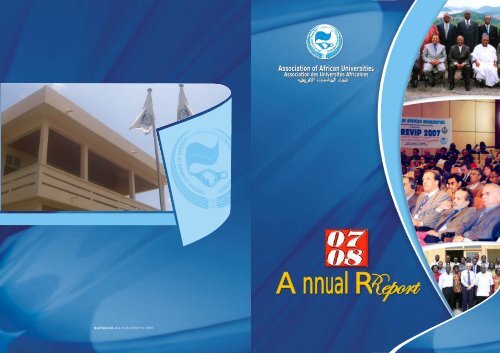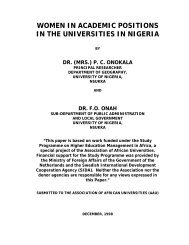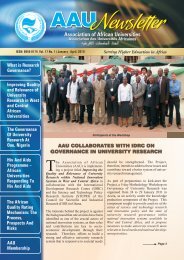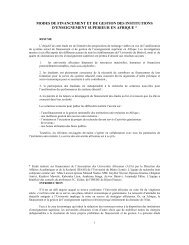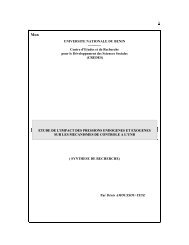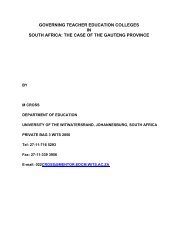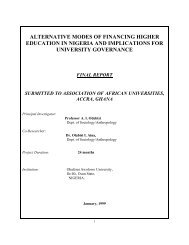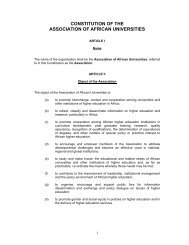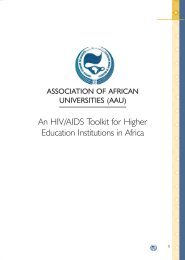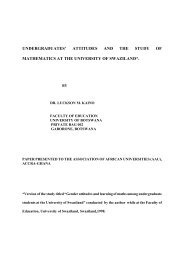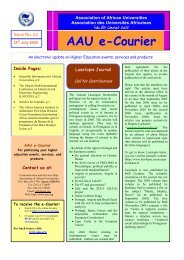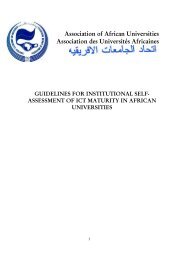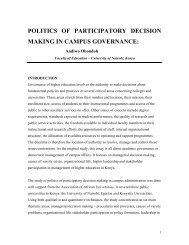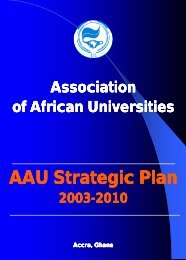aau annual report - AAU Resource Center - Association of African ...
aau annual report - AAU Resource Center - Association of African ...
aau annual report - AAU Resource Center - Association of African ...
- No tags were found...
You also want an ePaper? Increase the reach of your titles
YUMPU automatically turns print PDFs into web optimized ePapers that Google loves.
<strong>Association</strong> <strong>of</strong> <strong>African</strong> Universities<br />
<strong>Association</strong> des Universités Africaines<br />
Annual Report<br />
QualiType Ltd, Accra. Tel. (021) 325266-9 Fax: 325268,
<strong>Association</strong> <strong>of</strong> <strong>African</strong> Universities<br />
<strong>Association</strong> des Universités Africaines<br />
<strong>AAU</strong><br />
ANNUAL REPORT<br />
2007-2008<br />
07<br />
08<br />
Annual Report<br />
1
Contents<br />
C o n t e n t s<br />
<strong>AAU</strong><br />
ANNUAL REPORT<br />
2007-2008<br />
From the Secretary-General<br />
Pr<strong>of</strong>ile <strong>of</strong> the <strong>AAU</strong><br />
5<br />
7<br />
<strong>AAU</strong><br />
ANNUAL REPORT<br />
2007-2008<br />
Summary <strong>of</strong> 2007/08Activities<br />
a. Institutional Collaboration in Higher Education Leadership<br />
i. The Leadership Development Workshops<br />
ii. Management Training Programme<br />
iii.Leadership and Management Research Programme<br />
iv. Quality Assurance Support Programme<br />
v. Academic Mobility (Staff Exchange/Small Grants<br />
Grants for Dissertation & Theses)<br />
vi.Senior Executive Attachment<br />
vii. Higher Education and HIV & AIDS<br />
8<br />
OUR VISION<br />
To maintain the <strong>AAU</strong> as the representative voice <strong>of</strong> the <strong>African</strong> higher education<br />
community<br />
b. Special Issues<br />
i. The Ford Foundation International Fellowships<br />
Programme<br />
ii. Working Group on Higher Education<br />
OUR MISSION<br />
Information Communication and Technologies<br />
a. Supporting ICT Development/Research and Education<br />
Network Unit (RENU)<br />
b. Database <strong>of</strong> <strong>African</strong> Theses and Dissertation (DATAD)<br />
c. Communication and Services<br />
Staff Travels and Meetings/Conference Participation<br />
<strong>AAU</strong> Major Events<br />
a. The Conference <strong>of</strong> Rectors, Vice-Chancellors and Presidents<br />
b. <strong>African</strong> University Day<br />
c. <strong>AAU</strong> Receives Visitors<br />
23<br />
26<br />
30<br />
To raise the quality <strong>of</strong> higher education in <strong>African</strong> and strengthen its contribution to<br />
<strong>African</strong> development by:<br />
• Fostering cooperation and collaboration among member institutions.<br />
• Providing support to the core functions <strong>of</strong> teaching, learning, research and<br />
community engagement.<br />
• Facilitating critical reflection on, and consensus-building around issues<br />
affecting higher education and the development <strong>of</strong> Africa.<br />
<strong>AAU</strong> Staff Matters<br />
Financial Information<br />
Management Information System<br />
Partners<br />
34<br />
36<br />
39<br />
40<br />
2 3
<strong>AAU</strong> EXECUTIVE BOARD MEMBERS (2005-2009)<br />
FROM THE SECRETARY GENERAL<br />
<strong>AAU</strong><br />
ANNUAL REPORT<br />
2007-2008<br />
This <strong>annual</strong> <strong>report</strong> highlights the <strong>Association</strong> <strong>of</strong> <strong>African</strong> Universities' (<strong>AAU</strong>)<br />
achievements, as well as activities undertaken during the period May 2007 to<br />
June 2008.<br />
When I assumed <strong>of</strong>fice as Secretary-General in August, 2008, one <strong>of</strong> my first general<br />
observations was that programmes were being implemented within the context <strong>of</strong> the<br />
<strong>AAU</strong> Strategic Plan (2003 2010). My first task was, therefore, to engage all programme<br />
<strong>of</strong>ficers on a one-on-one interaction to familiarise myself with the current programmes<br />
and plans for their sustainability. My other general observation, and prime concern, was<br />
the low subscription inflows from <strong>AAU</strong> member institutions, a situation that has raised<br />
several concerns at the <strong>AAU</strong> Board meetings and at the General Conference level.<br />
Available records show that less than 45% <strong>of</strong> the current 212 members are in<br />
subscription arrears <strong>of</strong> three years and over. This situation has placed a heavy burden on<br />
the Secretariat's administrative cost, as subscriptions remain the second highest income<br />
inflow to the <strong>Association</strong>.<br />
<strong>AAU</strong><br />
ANNUAL REPORT<br />
2007-2008<br />
4<br />
1. Pr<strong>of</strong>. Njabulo S. NDEBELE (President), South Africa<br />
2. Pr<strong>of</strong>. Shamsudeen O.O. AMALI (Vice President), Nigeria<br />
3. Pr<strong>of</strong>. Abdolkabir ALFAHARY (Vice President), Libya<br />
4. Pr<strong>of</strong>. Matthew Atem ADUOL (Vice President), Sudan<br />
5. Pr<strong>of</strong>. George Albert MAGOHA, Kenya<br />
6. Pr<strong>of</strong>. Anselm B. LOWGA, Tanzania<br />
7. Rev. Pr<strong>of</strong>. Adow OBENG, Ghana<br />
8. Pr<strong>of</strong>. Ndiawar SARR, Senegal<br />
9. Pr<strong>of</strong>. Ehouan Etienne EHILE, Cote D'voire<br />
10. Pr<strong>of</strong>. Saleh HESHEN, Egypt<br />
11. Pr<strong>of</strong>. Beban Sammy CHUMBOW, Cameroon<br />
12. Pr<strong>of</strong>. Chrysologue KARANGWA, Rwanda<br />
13. Pr<strong>of</strong>. Lazarus HANGULA, Namibia<br />
14. Pr<strong>of</strong>. Cisco MAGAGULA, Swaziland<br />
15. Pr<strong>of</strong>. Sam Abel TSWANA, Zimbabwe<br />
16. Pr<strong>of</strong>. Akilagpa Sawyerr, Secretary General<br />
The year under review (May 2007 to June 2008) witnessed an increase in the number <strong>of</strong><br />
programmes undertaken by the <strong>AAU</strong>. A relatively new four-year programme,<br />
Mobilizing Regional Capacity Initiative (MRCI) funded by a £3.5 million grant from the<br />
Department for International Development (DFID) <strong>of</strong> the United Kingdom began with<br />
the release <strong>of</strong> the first tranche <strong>of</strong> funds for implementation. Components <strong>of</strong> other<br />
programmes, such as the <strong>AAU</strong> - Capacity Development Project the Revitalisation <strong>of</strong><br />
<strong>African</strong> Higher Education (CADRE), which is funded by the <strong>African</strong> Capacity Building<br />
Foundation (ACBF) were also effectively implemented, and continuous funding from<br />
development partners ensured effective programme delivery, though there were some<br />
challenges and constraints peculiar to individual programmes.<br />
The coming year appears not only to be busy, but challenging for the <strong>Association</strong>. First<br />
th<br />
the <strong>AAU</strong>'s 12 General Conference will be held in Abuja, Nigeria, in May, 2009, under the<br />
theme Sustainable Development in Africa: The Role <strong>of</strong> Higher Education and would be<br />
co-hosted by the Universities <strong>of</strong> Abuja and Ilorin. The challenge is not only for the <strong>AAU</strong> to<br />
build upon the successes <strong>of</strong> past General Conferences, but more specifically to guide<br />
<strong>African</strong> universities to be more pro-active in solving the continent's developmental<br />
challenges.<br />
Other challenges include increasing the momentum <strong>of</strong> programme delivery at the <strong>AAU</strong><br />
Secretariat and initiating new ones as approved by the General Conference under the<br />
new Core Programme <strong>of</strong> Activities (2009 -2012).<br />
5
<strong>AAU</strong><br />
ANNUAL REPORT<br />
2007-2008<br />
To effectively serve Africa better, universities and other higher education institutions on<br />
the continent need to network among themselves to develop collaborative<br />
programmes and share best practices. The <strong>AAU</strong>'s niche is in coordinating these efforts,<br />
and in reaching out to members spread out across the five sub-regions in Africa and in<br />
the major linguistic divides. It is hoped that in the coming years, <strong>AAU</strong> member<br />
institutions, especially those in good standing with the <strong>Association</strong>, would benefit<br />
greatly from its programmes. To those yet to join the <strong>Association</strong>, the <strong>AAU</strong> welcomes<br />
you to visit its web site (www.<strong>aau</strong>.org) for updates on higher education programmes<br />
and activities in Africa. To our numerous development partners and potential ones, we<br />
trust that we would merit your support for our programmes and activities to ensure an<br />
effective <strong>African</strong> higher education system responding to developmental needs.<br />
Goolam Mohamedbhai (Pr<strong>of</strong>)<br />
Secretary-General<br />
PROFILE OF THE <strong>AAU</strong><br />
The <strong>Association</strong> <strong>of</strong> <strong>African</strong> Universities (<strong>AAU</strong>), founded with an initial membership<br />
<strong>of</strong> 34 public universities on November 12, 1967 in Rabat, Morocco, serves as the<br />
continental organisation and principal forum for consultation, exchange <strong>of</strong><br />
information and cooperation among Higher Education Institutions (HEIs) in Africa. The<br />
<strong>AAU</strong>, which has its headquarters in Accra, Ghana, has grown in membership to 199 as <strong>of</strong><br />
April 2007.<br />
<strong>AAU</strong><br />
ANNUAL REPORT<br />
2007-2008<br />
Over the years the <strong>AAU</strong> has gained credibility among its member institutions, <strong>African</strong><br />
governments, donor partners and the higher education community globally. It enjoys a<br />
unique capacity for convening the vast majority <strong>of</strong> the <strong>African</strong> higher education<br />
community to reflect and consult on key issues affecting education in Africa, and for<br />
promoting cooperation and collaboration among its member institutions.<br />
Membership <strong>of</strong> the <strong>Association</strong> is diverse and truly continental, drawn from all parts <strong>of</strong><br />
the continent, and from all the major language and educational traditions. This gives the<br />
<strong>Association</strong> a unique capacity to coordinate activities and network institutions at the<br />
continental level, as well as to help fashion a common vision for <strong>African</strong> higher<br />
education. In addition, it has demonstrated the institutional capacity for developing and<br />
managing programs and providing services to its members.<br />
The <strong>Association</strong>'s Vision is to become the representative voice <strong>of</strong> the <strong>African</strong> higher<br />
education community both within and outside Africa. Its Mission is to raise the quality<br />
<strong>of</strong> higher education in Africa and strengthen its contribution to <strong>African</strong> development by<br />
fostering collaboration among its member institutions; by providing support to their<br />
core functions <strong>of</strong> teaching, learning, research and community engagement; and by<br />
facilitating critical reflection on, and consensus-building around, issues affecting higher<br />
education and the development <strong>of</strong> Africa.<br />
The <strong>AAU</strong> is governed by a General Conference comprising representatives <strong>of</strong> the<br />
member institutions and is convened once in every four years, while a Conference <strong>of</strong><br />
Rectors, Vice-Chancellors and Presidents (COREVIP) meets every two years to review<br />
issues <strong>of</strong> common concern to the universities. A Secretariat is responsible for the day-today<br />
running <strong>of</strong> the <strong>Association</strong> under the general supervision <strong>of</strong> an Executive Board.<br />
6 7
<strong>AAU</strong><br />
ANNUAL REPORT<br />
2007-2008<br />
SUMMARY OF 2007/08 ACTIVITIES<br />
During the period May 2007 to June 2008, new programmes were<br />
introduced, however, Institutional Collaboration in Higher Education,<br />
Leadership and Management, ICT and Special Issues were the broad areas<br />
that the <strong>Association</strong> developed and implemented programmes and activities. This was<br />
in accordance with the work plan based on the Strategic Plan 2003 2010 and the Core<br />
th<br />
Programme 2005 2009, which was approved by the Executive Board at its 64 Meeting<br />
in June 2007.<br />
This Report summarises programme implementation over the period May 2007 to June<br />
2008.<br />
NEW PROGRAMMES<br />
The Mobilising Regional Capacity Initiative<br />
The Mobilizing Regional Capacity Initiative (MRCI) is a new four-year programme<br />
funded by the Department for International Development (DFID) <strong>of</strong> United Kingdom<br />
within the broad frame <strong>of</strong> the <strong>African</strong> Union's Plan <strong>of</strong> Action for the Second Decade <strong>of</strong><br />
Education for Africa. The overall objective <strong>of</strong> the MRCI is to help higher education in<br />
Africa to act as a catalyst for poverty reduction and the achievement <strong>of</strong> the Millennium<br />
Development Goals (MDGs) within the framework <strong>of</strong> <strong>African</strong> Union's Plan <strong>of</strong> Action for<br />
the Second Decade <strong>of</strong> Education for Africa.<br />
At the centre <strong>of</strong> the MRCI is a Challenge Fund for the strengthening <strong>of</strong> partnerships<br />
between the <strong>AAU</strong> and regional and national bodies representing higher education<br />
institutions in Africa, as part <strong>of</strong> the drive for poverty eradication.<br />
During the <strong>report</strong>ing year, the following took place for the start <strong>of</strong>f <strong>of</strong> the Programme:<br />
1<br />
• A six-member Programme Steering Committee (PSC) was established in October<br />
2007.<br />
• A two-member team was selected to review proposals in the pilot phase <strong>of</strong><br />
Programme.<br />
• The first meeting <strong>of</strong> the PSC took place on December 12, 2007 and was attended<br />
by representatives <strong>of</strong> DFID and <strong>African</strong> regional higher education institutions.<br />
The following recommendations were made during the meeting:<br />
o Guidelines for submission <strong>of</strong> proposals needed to be developed.<br />
o A mapping exercise <strong>of</strong> all five regions <strong>of</strong> Africa to identify potential<br />
regional partners for collaboration in the implementation <strong>of</strong> MRCI<br />
Programme needed to be undertaken.<br />
o A Programme Coordinator for the MRCI Programme had to be<br />
appointed.<br />
o A capacity building workshop for regional higher education<br />
organisations had to be organised.<br />
A pilot phase <strong>of</strong> Programme was launched on December 13, 2007 to kick start<br />
implementation before the end <strong>of</strong> DFID's budget year in March 2008. To this effect, a call<br />
for proposals yielded four responses from the Southern <strong>African</strong> Regional Universities<br />
<strong>Association</strong>s (SARUA), the Inter-University Council <strong>of</strong> Eastern Africa (IUCEA), Higher<br />
Polytechnic Institute <strong>of</strong> GAZA (Mozambique), and Catholique University <strong>of</strong> Mozambique,<br />
Faculty <strong>of</strong> Economics and Administration (Mozambique).<br />
The SARUA proposal on Mainstreaming Higher Education for National and Regional<br />
Development was recommended by the selection panel and approved by the PSC for a<br />
grant award.<br />
The mapping exercise commissioned on the recommendation <strong>of</strong> the PSC, was to identify<br />
specific regional structures to serve as nodal points for the development, processing and<br />
oversight <strong>of</strong> research projects. The exercise was limited to Central, Northern and<br />
Western Africa, which did not have identifiable regional higher education organisations<br />
(RHEOs). Two studies were envisioned for West Africa - one each for Anglophone and<br />
Francophone West Africa, because <strong>of</strong> differences in the organization <strong>of</strong> higher education<br />
bodies in the two linguistic regions.<br />
A call for proposals for first cycle <strong>of</strong> Challenge Fund faced some challenges, because <strong>of</strong><br />
absence <strong>of</strong> regional higher education organisations in some regions. It was, therefore,<br />
decided that the <strong>AAU</strong> Secretariat receive and process applications from those areas,<br />
while applications from Eastern and Southern Africa be channelled through IUCEA and<br />
Southern <strong>African</strong> Regional UA.<br />
1<br />
Akilagpa SAWYERR, Secretary-General, <strong>Association</strong> <strong>of</strong> <strong>African</strong> Universities<br />
Sammy B. CHUMBOW, Former Rector, Université de Yaoundé I<br />
Faisal ELHAG, <strong>Association</strong> <strong>of</strong> Arab Universities<br />
Beatrice NJENGA, <strong>African</strong> Union<br />
8 Everett STANDA, Commission for Higher Education<br />
9<br />
Jean TCHOUGBE, Agence Universitaire Francophonie<br />
<strong>AAU</strong><br />
ANNUAL REPORT<br />
2007-2008
Pr<strong>of</strong>essor Olusola Oyewole, former Project Officer for <strong>AAU</strong> Quality Assurance<br />
Programme was appointed coordinator for the MRCI Programme in March 2008.<br />
INSTITUTIONAL COLLABORATION IN<br />
HIGHER EDUCATION<br />
<strong>AAU</strong><br />
ANNUAL REPORT<br />
2007-2008<br />
Leadership and Management<br />
Leadership Development Workshop<br />
The Leadership Development Workshop (LEDEV) series under the Leadership in Higher<br />
Education component <strong>of</strong> the <strong>AAU</strong> Capacity Development Project for the Revitalisation <strong>of</strong><br />
<strong>African</strong> Higher Education Institutions (<strong>AAU</strong>-CADRE) is a follow-up to <strong>AAU</strong>'s Senior<br />
University Management Workshop (SUMA) series, which was running between 1991<br />
2002. The objective <strong>of</strong> the SUMA series was to equip <strong>African</strong> university leadership with<br />
managerial skills. The SUMA workshops dealt broadly with issues <strong>of</strong> policy, funding,<br />
leadership and management. Later, the SUMA series was split into two separate<br />
components - Leadership Development (Ledev) and Management Development<br />
(MADEV) to reflect the unique training needs <strong>of</strong> the two aspects.<br />
<strong>AAU</strong><br />
ANNUAL REPORT<br />
2007-2008<br />
The MRCI Launch in Accra, Ghana, December 2007<br />
The <strong>Association</strong> <strong>of</strong> <strong>African</strong> Universities - Capacity Development Project for<br />
the Revitalisation <strong>of</strong> <strong>African</strong> Higher Education Institutions<br />
The <strong>Association</strong> <strong>of</strong> <strong>African</strong> Universities (<strong>AAU</strong>) and the Capacity Building Foundation<br />
(ACBF) launched a Capacity Development Project for the Revitalisation <strong>of</strong> <strong>African</strong> Higher<br />
Education Institutions (<strong>AAU</strong>-CADRE). This took place during the Conference <strong>of</strong> Rectors,<br />
Presidents and Vice-chancellors (COREVIP) organised in collaboration <strong>of</strong> the Khadafi<br />
Foundation in Tripoli, Libya in October 2007.<br />
LEDEV Workshop, which is targeted at newly appointed Rectors, Vice-Rectors, Vice-<br />
Chancellors, Deputy Vice-Chancellors <strong>of</strong> public and private institutions, as well as Council<br />
members, heads <strong>of</strong> national and regional accreditation agencies, among others has the<br />
objective <strong>of</strong> equipping <strong>African</strong> university leadership with managerial skills. During the<br />
year under review, the first LEDEV Workshop - LEDEV I was held in Windhoek, Namibia,<br />
from August 13 to 25, 2007. In all, there were 39 participants (one Pro-Vice Chancellor,<br />
eight Vice-Chancellors and Rectors, seven Pro and Deputy Vice-Chancellors, and 23 other<br />
leaders <strong>of</strong> higher education institutions and agencies) from 11 countries in Africa,<br />
namely; Botswana; Ghana; Kenya; Lesotho; Mozambique; Namibia; Nigeria; South Africa;<br />
Swaziland; Zambia; and Zimbabwe.<br />
The <strong>AAU</strong>-CADRE is being funded by the ACBF with an amount <strong>of</strong> US $2.8 million over a<br />
four-year period. The <strong>AAU</strong>-CADRE Project is geared towards assisting the <strong>AAU</strong> to fulfil<br />
its mission <strong>of</strong> assisting its members to build capacity to perform their core functions <strong>of</strong><br />
teaching, research and community engagement. The Project is, therefore, a unique<br />
collaboration for both the ACBF and the <strong>AAU</strong> to make a significant contribution to higher<br />
education in Africa.<br />
10<br />
11
<strong>AAU</strong><br />
ANNUAL REPORT<br />
2007-2008<br />
Additionally, there were seven women and seven participants from non-university<br />
tertiary institutions. The Workshop was funded by the <strong>African</strong> Capacity Building<br />
Foundation (ACBF), and the Swedish International Development Agency (Sida), as well<br />
as the revenue accrued from the registration fees <strong>of</strong> participants. During the<br />
Workshop, the Senior Executive Attachment Programme, which <strong>of</strong>fers grants for<br />
executive attachments at high-performing higher education institutions, was launched.<br />
Three out <strong>of</strong> eleven LEDEV applicants were selected for the programme.<br />
The second Leadership Workshop, LEDEV II was held from April 23 to May 02, 2008 and<br />
co-hosted by the Kigali Institute <strong>of</strong> Science and Technology in Kigali, Rwanda. A Training<br />
<strong>of</strong> Trainers' Workshop for Francophone resource persons was held parallel to the<br />
Workshop to prepare for the LEDEV III Workshop, which would be organized for<br />
Francophone institutions and scheduled for early 2009. Both LEDEV I and II deepened<br />
awareness <strong>of</strong> topics presented and possible approaches to addressing identified<br />
challenges. It also facilitated interaction between participants, which laid the basis for<br />
future networking.<br />
Management Development Workshop<br />
The Management Development (MADEV) Workshop is a component <strong>of</strong> the <strong>AAU</strong>'s new<br />
Leadership and Management Programme, which replaced the <strong>AAU</strong> SUMA series in<br />
(1991 2003) to cater for management training developing managerial skills and<br />
improving systems, processes and procedures to enhance quality <strong>of</strong> service delivery by<br />
managers in <strong>African</strong> higher education institutions. The objectives <strong>of</strong> this Workshop are<br />
to develop and enhance the competence <strong>of</strong> senior middle level university managers,<br />
namely; Provosts, Deans <strong>of</strong> Colleges, Schools and Faculties, heads <strong>of</strong> Departments and<br />
their deputies.<br />
The MADEV training is contracted out to competent management training providers<br />
in Africa. During the year under review, the Ghana Institute <strong>of</strong> Management and Public<br />
Administration (GIMPA), was the first institution to be contracted under this<br />
arrangement. The first Management Development Workshop - MADEV I was held at<br />
GIMPA, Greenhill Campus from February 25 to March 7, 2008 and was facilitated by<br />
GIMPA staff and Pr<strong>of</strong>essor Matthew Luhanga, the immediate past Vice Chancellor <strong>of</strong> the<br />
University <strong>of</strong> Dar es Salaam, Tanzania. The Workshop focused on eleven generic and<br />
job-specific management topics.<br />
Education in Africa (PHEA) Foundations' grantee universities (University <strong>of</strong> Nairobi,<br />
Kenya (Ford Foundation); and University <strong>of</strong> Cape Cast, Ghana (Hewlett Foundation))<br />
were subsidised with the grant from Carnegie.<br />
Leadership and Management Research Programme<br />
The Leadership and Management Research Programme is a component under Building<br />
Capacity in Leadership and Management <strong>of</strong> <strong>African</strong> Higher Education Institutions<br />
under the <strong>AAU</strong>-CADRE Project. It comprises a research grants scheme, where academic<br />
staff <strong>of</strong> the <strong>AAU</strong> member institutions (in good standing on the payment <strong>of</strong> subscriptions)<br />
is invited to submit proposals on a selected number <strong>of</strong> broad higher education leadership<br />
and management themes.<br />
The objective <strong>of</strong> the Project is to build up a cadre <strong>of</strong> <strong>African</strong> higher education researchers,<br />
policy analysts and managers to strengthen the institutional bases <strong>of</strong> higher education<br />
research in Africa, and generate and disseminate new knowledge about <strong>African</strong> higher<br />
education.<br />
During the year under review, the first call for proposals in April 2007 yielded few<br />
proposals, while the second call on five main themes (Innovative Higher Education<br />
Leadership and Management Practices; Change Management; University Management<br />
for Quality and Equitable Access; Research Management; and Human <strong>Resource</strong><br />
Management attracted 35 proposals; 30 from <strong>AAU</strong> member institutions (19 from<br />
members in good standing and 11 from members not in good standing) and five from<br />
non-<strong>AAU</strong> member institutions.<br />
The proposals focused on the following areas: <strong>Resource</strong> Allocation; Research Funding<br />
and Management; Staff Recruitment and Retention; Managing Merged Universities;<br />
Mentoring and Career Development; the Demand for Higher Education versus Market<br />
Signals; Challenges and Policy Responses to Cross-Border Provision <strong>of</strong> Higher Education;<br />
Women in Leadership; Institutional Culture; Mainstreaming Environment; and Building<br />
Entrepreneurship among Undergraduates. They were sorted out with particular<br />
attention to the membership and subscription payment status <strong>of</strong> applicants' institutions,<br />
and compatibility with select research themes. In all, 18 viable proposals were reviewed<br />
in-house and externally to select the best four for sponsorship.<br />
<strong>AAU</strong><br />
ANNUAL REPORT<br />
2007-2008<br />
The 10-day Workshop was attended by 44 participants from Ghana, Kenya, Nigeria, and<br />
Tanzania. Twenty participants (45%) from <strong>AAU</strong> member universities in good standing<br />
received travel, accommodation and other subsidies from ACBF-CADRE and Sida-<br />
NORAD (HIV & AIDS) grants.<br />
An additional funds was secured from Carnegie Corporation to cover travel, lodging and<br />
subsistence allowance for the remaining 24 participants from the Corporation's grantee<br />
universities, namely the University <strong>of</strong> Ghana, Ghana; University <strong>of</strong> Education,<br />
Winneba, Ghana; University <strong>of</strong> Development Studies, Ghana; Obafemi Awolowo<br />
University, Nigeria; University <strong>of</strong> Jos, Nigeria; Ahmadu Bello University, Nigeria; and<br />
University <strong>of</strong> Dar es Salaam, Tanzania.<br />
12<br />
Road transport and incidental expenses for participants from the Partnership for Higher<br />
13
The <strong>AAU</strong> web site was updated with an up-to-date database <strong>of</strong> QA practitioners and <strong>AAU</strong><br />
in collaboration with the <strong>African</strong> Union hosted web discussion on harmonization and<br />
ratings <strong>of</strong> higher education in Africa from July to November, 2007.<br />
In collaboration with the <strong>African</strong> Union, a stakeholders meeting was held in Accra from<br />
March 27 - 28, 2008 on the Arusha Convention and existing practices in cross-border<br />
recognition <strong>of</strong> qualifications among <strong>African</strong> countries. A seven-member advisory<br />
committee comprising regional and international QA experts was set up and organised<br />
two meetings to advise on developing the project work plan. The project work plan was<br />
developed and approved by <strong>AAU</strong> Executive Board, with two-member team comprising a<br />
Project Officer and an Assistant Project Officer now operational at <strong>AAU</strong> Secretariat.<br />
<strong>AAU</strong><br />
ANNUAL REPORT<br />
2007-2008<br />
Quality Assurance Support Programme for <strong>African</strong> Higher Education<br />
The Quality Assurance (QA) Support Programme for <strong>African</strong> Higher Education is a<br />
World Bank Funded activity for promoting quality assurance activities in h i g h e r<br />
education in Africa. This is in line with the Arusha Convention, a regional convention on<br />
the recognition <strong>of</strong> studies, certificates, diplomas, degrees and other academic<br />
qualifications in higher education in <strong>African</strong>countries. The objective <strong>of</strong> the QA<br />
Programme is to lay a foundation for institutionalized quality assurance mechanisms<br />
within tertiary institutions, national quality assurance and accreditation agencies, and<br />
an eventual regional network for coordination <strong>of</strong> cross-border protocols and<br />
specialized capacity building in QA. The Programme, which targets <strong>AAU</strong> member<br />
universities and <strong>African</strong> Higher Education QA, also received funding from the Global<br />
Initiative for Quality Assurance Capacity (GIQAC).<br />
Academic Mobility (Staff Exchange/Small Grants for Theses and Dissertations)<br />
Academic Mobility, which targets staff and post-graduate students <strong>of</strong> <strong>AAU</strong> member<br />
institutions, is one <strong>of</strong> the most popular <strong>of</strong> the <strong>AAU</strong> Programmes, and comprises two<br />
separate components, namely:<br />
• Small Grants for Theses and Dissertations (grants to facilitate early completion <strong>of</strong><br />
post-graduate theses and to ensure quality <strong>of</strong> the research work undertaken).<br />
• Academic Staff Exchange (supports academics from <strong>AAU</strong> member institutions<br />
undertaking short-term research work, teaching assignments, external examining<br />
and supervision <strong>of</strong> both post and undergraduate theses).<br />
The objective <strong>of</strong> this programme is to promote academic mobility, networking and<br />
institutional collaboration as a vehicle for achieving the strategic goal <strong>of</strong>, supporting<br />
<strong>African</strong> higher education institutions in their core functions <strong>of</strong> teaching, learning,<br />
research and service to their community.<br />
<strong>AAU</strong><br />
ANNUAL REPORT<br />
2007-2008<br />
14<br />
During the year under review, a lot <strong>of</strong> activities took place. Quality Assurance Needs<br />
Assessment studies were carried out in Anglophone West Africa, the 17 Francophone<br />
countries in Africa, North Africa and Arabophone countries, Portuguese-speaking<br />
countries and East <strong>African</strong> countries. In addition, curriculum for Training <strong>of</strong> Trainers in<br />
institutional self-assessment were developed and reviewed and training workshops on<br />
institutional self-assessment were conducted for Southern and East <strong>African</strong> countries.<br />
Furthermore, the <strong>AAU</strong> entered into collaboration with Council for Higher Education<br />
(CHE), Pretoria, South Africa, National Universities Commission (NUC), Abuja, Nigeria;<br />
and Conseil Africain et Malgache pour l'Enseignement Supérieur (CAMES), Burkina<br />
Faso.<br />
Other events that took place during the year under review to support existing and<br />
emerging QA agencies include, discussions on UNESCO and ADEA/WGHE training for<br />
national QA agencies; discussions with NUC and UNESCO on developing and delivering<br />
tripartite QA Distance Education Course; an Agreement was entered into with UNESCO<br />
for a Distance Learning Course on Quality Assurance for the French-speaking countries<br />
in Africa; <strong>African</strong> QA Network (AfriQAN) launched an initiative to facilitate cross-country<br />
knowledge sharing in QA on September 17, 2007 with NUC, the South <strong>African</strong> Council<br />
for Higher Education (CHE) and CAMES (Francophone Africa) as founding members.<br />
Small Grants<br />
During the year under review, one out <strong>of</strong> seven 2006/2007 theses were submitted and<br />
deposited with <strong>AAU</strong> Database <strong>of</strong> <strong>African</strong> Theses and Dissertations (DATAD), When the<br />
2008/2009 grants were advertised in September 2007, 31 applications (18 PhD and 13<br />
Masters) were received by the deadline <strong>of</strong> November 2007, and 20 grants (12 PhD and 8<br />
Masters) to tune <strong>of</strong> US$61,500 were awarded to applicants, who had fulfilled all the<br />
requirements expected <strong>of</strong> them. Disbursements were accordingly made in respect <strong>of</strong><br />
students, who provided their bank account details.<br />
Staff Exchange<br />
Two out <strong>of</strong> three candidates who qualified for the Staff Exchange Programme completed<br />
their missions in 2006/2007, and presented <strong>report</strong>s endorsed by the VCs <strong>of</strong> their host<br />
universities. The candidates were Dr (Mrs) A. Kharkar from the University <strong>of</strong> Mauritius,<br />
who went to the University <strong>of</strong> Swaziland and Pr<strong>of</strong>essor M.Saber El Sayed, <strong>of</strong> Ain Shams<br />
University, Cairo, who went to National University <strong>of</strong> Science and Technology, Zimbabwe.<br />
In addition, a call for nominations for the 2007/2008 Staff Exchange Programme was put<br />
out at the Conference <strong>of</strong> Rectors, Vice-Chancellors and Presidents (COREVIP), which was<br />
held in Triploi, Libya in October 2007, with a deadline <strong>of</strong> November 2007. The call<br />
attracted 16 applications and five fellowships were awarded.<br />
15
Senior Executive Attachment<br />
The Senior Executive Attachment Programme is a component <strong>of</strong> the <strong>AAU</strong>-CADRE<br />
Project funded by the <strong>African</strong> Capacity Building Foundation (ACBF). Senior academics<br />
(Vice-Chancellors, Rectors, President, Principals, Deans <strong>of</strong> Faculty and Directors <strong>of</strong><br />
institutions, and their deputies) in <strong>African</strong> higher education institutions are selected to<br />
undertake attachments in high-performing higher education institutions in Africa for<br />
the purpose <strong>of</strong> enhancing their leadership and management skills through experiential<br />
learning.<br />
<strong>AAU</strong><br />
ANNUAL REPORT<br />
2007-2008<br />
The objective <strong>of</strong> the Programme is to help improve the performance <strong>of</strong> <strong>African</strong> tertiary<br />
education institutions in their core functions <strong>of</strong> teaching learning, research and<br />
community service. The Senior Executive Attachment Programme was originally a<br />
separate component <strong>of</strong> <strong>AAU</strong>-CADRE Project, but later linked LEDEV and MADEV<br />
Workshops, subject to the approval <strong>of</strong> the ACBF.<br />
Participants at Regional Workshop on HIV/AIDS at the University <strong>of</strong> Port Harcourt, Nigeria<br />
<strong>AAU</strong><br />
ANNUAL REPORT<br />
2007-2008<br />
The first round <strong>of</strong> fellowships was announced together with first LEDEV Workshop.<br />
Interested participants were asked to submit brief proposals with their bios and pr<strong>of</strong>iles<br />
<strong>of</strong> their institutions, which were reviewed by LEDEV <strong>Resource</strong> Persons. Three<br />
applicants, namely; the Ag. Vice-Chancellor <strong>of</strong> Copper-Belt University, Zambia; the<br />
Head <strong>of</strong> School <strong>of</strong> Nursing at University <strong>of</strong> Kwazulu-Natal, South Africa and Dean <strong>of</strong><br />
School <strong>of</strong> Pure and Applied Sciences <strong>of</strong> Kenyatta University, Kenya were selected out <strong>of</strong><br />
11 applicants for the programme.<br />
The Attachment Programme was advertised again during the first MADEV Workshop<br />
from February 25 to March 7, 2008, which was held in Accra, Ghana, with; one more<br />
fellowship awarded, bringing the total fellowship awards to four.<br />
The third <strong>AAU</strong> sub-regional workshop on HIV & AIDS Toolkit was held from March 17 21,<br />
2008 and hosted by University <strong>of</strong> Port Harcourt. The Workshop was attended by 35<br />
participants from 17 institutions from four countries in the sub-region. During the<br />
Workshop, 10 modules <strong>of</strong> the HIV & AIDS Toolkit, together with institutional experiences<br />
in managing HIV on various campuses were presented and discussed. The University <strong>of</strong><br />
Port Harcourt, which was appointed to house the West <strong>African</strong> HIV & AIDS Network, took<br />
the opportunity during the Workshop to launch its HIV& AIDS Policy. An amount <strong>of</strong><br />
US$35,000 was contributed towards development <strong>of</strong> HIV & AIDS training modules for<br />
both the LEDEV and MADEV Workshops, which were on August 13 25, 2007 and<br />
February 24 to March 08, 2008, respectively.<br />
16<br />
Higher Education and HIV & AIDS<br />
The Higher Education and HIV & AIDS Programme, which targets staff and students <strong>of</strong><br />
<strong>AAU</strong> member<br />
institutions is a multi-disciplinary Programme that systematically addresses major<br />
aspects <strong>of</strong> the HIV & AIDS pandemic in <strong>African</strong> higher education institutions. The<br />
Programme aims at ensuring that the <strong>African</strong> higher education community uses all<br />
available means within the institutions and through partnerships with the international<br />
community, to prevent the spread, mitigate the impact and manage the HIV& AIDS<br />
epidemic through proactive sustainable programmes <strong>of</strong> action.<br />
During the <strong>report</strong>ing period a parallel session on HIV & AIDS was held at COREVIP 2007<br />
and involved experience-sharing on management <strong>of</strong> the pandemic using findings <strong>of</strong> the<br />
<strong>AAU</strong> study on best practices; demonstration on the use <strong>of</strong> the HIV & AIDS Toolkit;<br />
distribution <strong>of</strong> the Toolkit CD ROM; and discussions on the future <strong>of</strong> the <strong>AAU</strong> HIV<br />
Programme.<br />
Five out <strong>of</strong> 15 <strong>AAU</strong> member institutions, namely Daystar University, Nairobi, Kenya;<br />
University <strong>of</strong> Botswana, Gaborone, Botswana; University <strong>of</strong> Dschang, Cameroon; and<br />
University <strong>of</strong> Port Harcourt, Nigeria were given grants <strong>of</strong> US$5,000 each to develop<br />
institutional HIV & AIDS policies; University <strong>of</strong> Port Harcourt submitted their approved<br />
policy, while Daystar University and University <strong>of</strong> Dschang draft policies. The<br />
Universities <strong>of</strong> Botswana and Nairobi are yet to submit their policies.<br />
During the year under review, eight <strong>AAU</strong> member institutions were awarded $3,300 each<br />
to organise skills training for academics on integrating HIV & AIDS into University<br />
curricula; six institutions submitted <strong>report</strong>s and two others are waiting for transfer <strong>of</strong><br />
funds to initiate activity, as at the time this <strong>report</strong> was compiled. In addition, best<br />
practices <strong>of</strong> universities' responses to HIV & AIDS in Africa identified through surveys and<br />
findings were presented at COREVIP 2007 and now available on CD ROM.<br />
Small grants were awarded to research related to HIV & AIDS during the <strong>report</strong>ing year.<br />
Fifteen out <strong>of</strong> 64 small grant applicants were awarded US $1,000 for research related to<br />
HIV & AIDS. Eight studies have been completed and submitted and progress <strong>report</strong>s from<br />
remaining seven and final <strong>report</strong>s are expected by end June 2008.<br />
The HIV & AIDS Project ended <strong>of</strong>ficially in December 2007, but granted budget neutral<br />
extension to end March 2008. Efforts to secure funding for the second phase are<br />
underway and draft proposals have been submitted to Sida and CIDA to be discussed at<br />
round table donors' meeting to which the <strong>African</strong> Development Bank (AfDB) would be<br />
invited.<br />
17
successfully. Ten requests were made for Pr<strong>of</strong>essional Enhancement Fund; Eight<br />
requests for Family Funds; and one request for a research fund. Academic <strong>report</strong>s reveal<br />
all Fellows were performing well, while nine Fellows had their contracts renewed.<br />
SPECIAL ISSUES<br />
Ford Foundation's International Fellowships Programme<br />
The Ford Foundation's International Fellowships Programme (IFP) was launched<br />
in 2000 to provide support for up to three years <strong>of</strong> formal post-graduate study<br />
for exceptional students from deprived regions <strong>of</strong> the world. The Programme<br />
operates in 22 countries worldwide and has to date sponsored 2,421 IFP Fellows to<br />
undertake masters, doctoral and other advanced degree programmes at first class<br />
universities in Europe, North America and in Africa. By the end <strong>of</strong> the programme in<br />
2014, the programme would have supported total <strong>of</strong> 4,440 Fellows. The <strong>AAU</strong> coordinates<br />
the Programme in West Africa (Ghana, Nigeria and Senegal).<br />
In the case <strong>of</strong> Nigeria, a total <strong>of</strong> 24 Fellows were still in school during the <strong>report</strong>ing<br />
period. Eighteen continued studies under other forms <strong>of</strong> support, while five Fellows<br />
completed studies and seven returned home. Two Fellows from Senegal requested<br />
disbursement <strong>of</strong> Pr<strong>of</strong>essional Enhancement funds; five grants were renewed; two<br />
requests for Family Funds approved. In addition, three Fellows who submitted final<br />
<strong>report</strong>s had their repatriation plans approved and were expected home when this<br />
Report was being compiled.<br />
<strong>AAU</strong><br />
ANNUAL REPORT<br />
2007-2008<br />
During the year under review, the Project Officer attended the following events and<br />
meetings:<br />
• The funeral <strong>of</strong> the late Mrs. Mary Taidi Abu (IFP Project Assistant, Pathfinder<br />
Nigeria) in July 2007 in Lagos, Nigeria<br />
• A meeting with the West <strong>African</strong> Research Centre (WARC), the new IFP<br />
Implementing Partner for Senegal in October 2007<br />
The Regional Annual Review Meeting, held in Nairobi, Kenya in November<br />
2007<br />
<strong>AAU</strong><br />
ANNUAL REPORT<br />
2007-2008<br />
During the <strong>report</strong>ing period, 58 candidates qualified for the fellowships. The break down<br />
was as follows: 24 from Ghana; 22 from Nigeria and 12 from Senegal. Eventually, 34<br />
candidates were awarded the Fellowship. Five were Ghanaians, 17 Nigerians and 12<br />
Senegalese. Ghana had six unused slots, which were added to next round <strong>of</strong> selections.<br />
During the year under review, an Orientation and Needs Assessment meetings were held<br />
in Ghana from September 16 - 22, 2007 and in Nigeria and Senegal, from September 10 -<br />
16, 2007, to plan for the one year Fellowelect phase. Activities included orientation to<br />
IFP objectives, roles and responsibilities <strong>of</strong> Fellows-Elect and management <strong>of</strong><br />
fellowships, information on opportunities, requirements and realities <strong>of</strong> studying in the<br />
various IFP regions (UK, USA and South Africa) as well as the determination <strong>of</strong> preacademic<br />
training requirements.<br />
Fellowships for 2009/2010 were advertised in both print and electronic media (<strong>AAU</strong> and<br />
Pathfinder, Nigeria web sites), with a deadline <strong>of</strong> February 29, 2008 for submission <strong>of</strong><br />
applications. During the <strong>report</strong>ing year, Senegal was, however, excluded from this round<br />
given a change in management <strong>of</strong> the Programme in the country.<br />
A Cohort Building Meeting was held in Akosombo, Ghana, from February 3 to 8 2008 on<br />
theme 'Leadership in a Globalised World.' All the 34 Fellows-Elect from Ghana, Nigeria<br />
and Senegal were in attendance. Topics that were discussed during the meeting<br />
included; Leadership for Social Justice, Emerging Issues in Africa (Good<br />
Governance/NEPAD/Political Leadership and HIV & AIDS) and, Networking and Cross<br />
Cultural Communication.<br />
IFP Fellows-elect at a needs-assessment Meeting<br />
18<br />
During the <strong>report</strong>ing year, 22 fellows from Ghana were still pursuing programmes and<br />
grants were extended for two candidates to enable them complete programmes<br />
19
<strong>AAU</strong><br />
ANNUAL REPORT<br />
2007-2008<br />
20<br />
Working Group on Higher Education<br />
The period under review, May 2007- June 2008, was an extremely productive year the<br />
WGHE, as the Secretariat sought to balance implementation <strong>of</strong> the Group's approved<br />
Annual Work Programme with responding to <strong>AAU</strong> and ADEA-led activities, while<br />
selectively honouring invitations by partners and at the same time, seeking to fulfil the<br />
Secretariat's intelligence role. The WGHE <strong>annual</strong> work programmes are developed<br />
within the framework <strong>of</strong> an approved Strategic Plan with specific agreed objectives.<br />
For 2007-9 specific objectives agreed by the Groups' Steering Committee were to:<br />
• Encourage system-wide and institutional reforms.<br />
• Support the revitalization <strong>of</strong> a diverse tertiary education system.<br />
• Take WGHE initiatives from pilot to sustainability.<br />
• Promote increased recognition for the contribution <strong>of</strong> tertiary education to<br />
Africa's development.<br />
• Support efforts aimed at maximizing the use <strong>of</strong> highly skilled personnel for the<br />
development <strong>of</strong> tertiary education in Africa.<br />
ACHIEVEMENTS<br />
Publication and Dissemination <strong>of</strong> the Differentiation and Articulation Study<br />
Knowledge <strong>of</strong> the two key concepts <strong>of</strong> differentiation and articulation in tertiary systems<br />
is very scanty and a great deal <strong>of</strong> more research needs to be done with a view to<br />
anchoring differentiation and articulation within national tertiary education systems in<br />
Africa. This was the conclusion <strong>of</strong> a study, the WGHE published jointly in 2007/8 with the<br />
World Bank and the <strong>Association</strong> <strong>of</strong> <strong>African</strong> Universities (<strong>AAU</strong>) that explored the extent<br />
and nature <strong>of</strong> differentiation and articulation in <strong>African</strong> tertiary education systems in<br />
Africa. The study, conducted by Njuguna Ng'ethe (Kenya), George Subotzky (South<br />
Africa) George Afeti (Ghana) observed that differentiation in <strong>African</strong> higher education is<br />
mostly horizontal as opposed to vertical differentiation.<br />
Mainstreaming Gender in Higher Education in Africa<br />
Three activities were carried out in 2007-8 under the Gender pilot initiatives to translate<br />
the English version <strong>of</strong> a Toolkit for Mainstreaming Gender in Higher Education in Africa<br />
into French and Portuguese and to disseminate it widely through cost-effective modes<br />
on CD-ROMS. The gender content on the <strong>AAU</strong> website was also reorganized with links<br />
provided to ADEA and partners' web sites www.<strong>aau</strong>.org and www.adeanet.org. The<br />
WGHE also began efforts to mobilise resources in support <strong>of</strong> scaling up its gender pilot to<br />
become an <strong>AAU</strong> Core Programme. The WGHE has plans to partner with the UNESCO<br />
Bamako Cluster Office and the National Universities Commission <strong>of</strong> Nigeria (NUC) in<br />
September 2008 to deliver an online training course for teachers and academics using<br />
the Gender Mainstreaming Toolkit (www.viheaf.org).<br />
Supporting the Licence Masters-Doctorate Reforms<br />
In 2007, the WGHE commissioned le Réseau d´Excellence pour l´Enseignement<br />
Supérieur en Afrique de l´Ouest (REESAO) to develop a Training Manual for Stakeholders<br />
<strong>of</strong> the Licence-Master-Doctorate (LMD) Reform, and to plan a capacity building<br />
Workshop jointly with the UNESCO Bamako Cluster Office for 50 participants drawn<br />
largely from the West <strong>African</strong> Monetary and Economic Union (UEAMOA) for September<br />
2008. The LMD reform will align the Francophone higher education degree structure to<br />
that <strong>of</strong> Anglophone system's Bachelor-Master-PhD and is expected to facilitate<br />
comparability <strong>of</strong> academic programmes and mutual recognition <strong>of</strong> degrees.<br />
Document and Share knowledge on Higher Education and Research Contribution to<br />
Education for All Goals<br />
Since 2006, the WGHE has been collaborating with the International <strong>Association</strong> <strong>of</strong><br />
Universities (IAU) the Strengthening Linkages for Improved Education: Higher Education<br />
and Research Working for EFA and education-related MDGs project. In January 2007,<br />
the IAU and partners organised a seminar in Maputo, Mozambique to share its findings.<br />
Other forums where the findings were presented in 2007 were the UNESCO Forum on<br />
Higher Education Research and Knowledge, which was organised from March 22-25 in<br />
Accra, Ghana and the Second International Conference on Quality Assurance in Africa in<br />
Dar es Salaam, Tanzania in September. The IAU in 2007 completed a related paper,<br />
which the Global Monitoring Report (GMR) commissioned to review the role <strong>of</strong><br />
research in generating knowledge for EFA. The paper by N.V. Varghese, Head Higher<br />
th<br />
Education Programmes, UNESCO-IIEP, will be presented at the 8 Meeting <strong>of</strong> the EFA<br />
High Level Group, from 16-18 December 2008. It will also be made available online in<br />
the middle <strong>of</strong> September on the GMR web site and published in the 2009 EFA GMR on<br />
Governance and Financing <strong>of</strong> Education.<br />
Knowledge Sharing Annual Forums on TE Reforms across Linguistic and Cultural<br />
Divides<br />
In October 2007, the WGHE participated in the <strong>AAU</strong> Conference <strong>of</strong> Rectors, Vice<br />
Chancellors and Presidents (COREVIP) on the theme: 'The <strong>African</strong> Brain Drain -<br />
Managing the Drain: Working with the Diaspora' and contributed the preliminary<br />
findings <strong>of</strong> the Staff Retention and Diaspora Study. The WGHE sponsored <strong>African</strong><br />
members <strong>of</strong> its Steering Committee to attend the COREVIP and also organized a parallel<br />
event on gender. Participants commended the WGHE for initiating the gender pilot and<br />
recommended to <strong>AAU</strong> to scale it up by disseminating the Toolkit widely and to raise the<br />
funding needed to support its members to scale up the project.<br />
Contribution to ADEA 2008 Biennale<br />
In 2007, The WGHE collaborated with the <strong>AAU</strong>, the World Bank and the ADEA<br />
Secretariat to contribute the results <strong>of</strong> seven studies to the ADEA 2008 Biennale held<br />
from May 5-9 in Maputo, Mozambique on the theme, Beyond Primary Education:<br />
Challenges and Approaches to Expanding Learning Opportunities in Africa:<br />
1. Study <strong>of</strong> the Differentiation and Articulation within Tertiary Education Systems:<br />
A Study <strong>of</strong> Twelve <strong>African</strong> Countries by Njuguna Ng'ethe (Kenya), George<br />
Subotzky (South Africa) George Afeti (Ghana).<br />
2. Study <strong>of</strong> the Effects <strong>of</strong> Massification on Higher Education in Africa by Pr<strong>of</strong>essor<br />
Goolam Mohamedbhai.<br />
3. Staff Retention and Links with Diaspora Study by Pr<strong>of</strong>essor Paschal Mihyo,<br />
which WGHE also contributed to the <strong>AAU</strong> Conference <strong>of</strong> Rectors Vice<br />
Chancellors and Presidents (COREVIP) held in Tripoli Libya in October 2007.<br />
4. Results <strong>of</strong> a pilot project on Higher Education and Research Role and<br />
Contribution to the Achievement <strong>of</strong> Education for All (EFA) and Millennium<br />
Development Goals (MDGs) implemented in collaboration with the<br />
<strong>AAU</strong><br />
ANNUAL REPORT<br />
2007-2008<br />
21
<strong>AAU</strong><br />
ANNUAL REPORT<br />
2007-2008<br />
International <strong>Association</strong> <strong>of</strong> Universities (IAU)<br />
5. The Role and Contribution <strong>of</strong> Higher Education to Improving the Quality <strong>of</strong> Basic<br />
Education: Case Study <strong>of</strong> the Centre for Research on Improving Quality <strong>of</strong> Primary<br />
Education in Ghana (CRIQPEG) by a team from University <strong>of</strong> Cape Coast.<br />
6. The Implications <strong>of</strong> the LMD Reforms.<br />
7. State, Markets, Faith and Proliferation <strong>of</strong> Private Higher Education in Africa by by<br />
N.V. Varghese.<br />
All the studies made specific recommendations for policy makers, higher education<br />
institutions and development partners. Arising from the Staff Retention Study, the<br />
Partnership for Higher Education in Africa (PHEA) has since hosted a one-day workshop at<br />
the Africa Grant makers' Affinity Group Conference and in 2008, is exploring ways <strong>of</strong><br />
developing and retaining the next generation <strong>of</strong> <strong>African</strong> academics.<br />
Steering Committee Meetings<br />
During the period under review, the WGHE organised three productive meetings <strong>of</strong> its<br />
Steering Committee in Accra, Ghana in April 2007, in Tunis in October 2007 and in Maputo<br />
in May 2008, where members made significant input into the Group's 2008 and 2009<br />
work programmes and reviewed the 2007 Activities <strong>report</strong>. The Steering Committee<br />
decided to streamline and reduce the workload <strong>of</strong> the WGHE Secretariat through shared<br />
responsibility <strong>of</strong> members for implementation <strong>of</strong> <strong>annual</strong> work programmes. An<br />
innovation was introduced to have keynote presentations at each Steering Committee<br />
meeting on topical issues affecting higher education in Africa. Pr<strong>of</strong>essor Narciso Matos,<br />
the immediate past chair <strong>of</strong> the Steering Committee delivered the first key note on the<br />
theme, Challenges and Trends in Higher Education in Africa.<br />
Overall, the WGHE achieved a high output during the period under review. In 2007, the<br />
ADEA Steering Committee made important decisions regarding its Working Group as part<br />
<strong>of</strong> efforts to streamline their mandates and functions. In the case <strong>of</strong> the WGHE, the<br />
Steering Committee decided to maintain and resource the Group to deliver on its core<br />
mandate while it plans for its graduation. The ADEA Secretariat and Working Groups, in<br />
2008, will jointly develop performance management frameworks (PMFs) by which<br />
Working Groups will be externally evaluated in 2010 and the results guide the Steering<br />
Committee's decisions on the future <strong>of</strong> each Working Group in terms continuation,<br />
graduation or dissolution.<br />
Achievements attributed to the Group since its inception in 1989 are:<br />
• The ability to keep higher education on the agenda <strong>of</strong> donor agencies and <strong>African</strong><br />
governments.<br />
• Promoting dialogue between the institutions and higher education policy makers.<br />
• Promoting the sharing <strong>of</strong> good practices among institutions mainly through<br />
partnership with the <strong>AAU</strong>.<br />
• Enhancing insights and understanding <strong>of</strong> representatives <strong>of</strong> donor agencies on<br />
issues in <strong>African</strong> higher education.<br />
• Broadening <strong>of</strong> mutual understanding <strong>of</strong> one another's perspectives between<br />
<strong>African</strong> higher education leaders and donor agency representatives<br />
• Strengthening the capacity and role <strong>of</strong> the <strong>AAU</strong> to support its members.<br />
INFORMATION COMMUNICATION<br />
AND TECHNOLOGIES<br />
Supporting ICT Development/ Research and Education Network Unit (RENU)<br />
The Research and Education Network Unit ICT advocacy/promotion programme<br />
has the objective <strong>of</strong> enhancing access to, promoting effective utilisation <strong>of</strong> ICT<br />
in higher education in Africa, and acting as focal point for many ICT initiatives in<br />
education and research networking on the continent. The Programme targets <strong>AAU</strong><br />
member institutions and research institutions in Africa.<br />
During the year under review the RENU coordinator participated in several conferences<br />
and meetings on bandwidth and research and education networking. The coordinator<br />
made presentations highlighting the present plight <strong>of</strong> <strong>African</strong> higher education<br />
institutions regarding connectivity, and the importance <strong>of</strong> creating an enabling<br />
environment for access to affordable bandwidth.<br />
During the <strong>report</strong>ing year a Guide on Research and Education Networking Policy for a<br />
better understanding <strong>of</strong> philosophy and advantages <strong>of</strong> NRENs was developed,<br />
published and disseminated.<br />
In addition, the RENU coordinator facilitated a one and a half day ICT session held at the<br />
first LEDEV workshop, which took place on August 2007, in Windhoek, Namibia, as well<br />
as at the LEDEV workshop that took place in April 2008 in Kigali. Other activities that<br />
RENU engaged in during the year under review included the development <strong>of</strong> a French<br />
version <strong>of</strong> ICT module, which will be used during the LEDEV workshop for Francophone<br />
<strong>African</strong> higher education institutions leaders scheduled for January 2009. The RENU<br />
coordinator also facilitated a parallel session on ICT held during the COREVIP 2007 held<br />
in Tripoli, Libya in October 2007.<br />
A five-day training workshop for campus network managers was also organised in<br />
Yaoundé from April 7-11 2008; it was held in cooperation with the <strong>African</strong> Regional<br />
Registry for Internet Numbers (AfriNIC), the <strong>African</strong> Network Operators Group (AfNOG),<br />
the French Research and Education Network (RENATER) and Ecole Nationale<br />
Supérieure Polytechnique <strong>of</strong> Yaoundé (ENSPY), with funding from <strong>African</strong> Capacity<br />
Building Foundation (ACBF) Partnership for Higher Education in Africa (PHEA),<br />
International Development Research Centre (IDRC) and the French Ministry <strong>of</strong> Foreign<br />
and European Affairs.<br />
The RENU Coordinator organised the <strong>annual</strong> meeting <strong>of</strong> stakeholders <strong>of</strong> <strong>African</strong><br />
Research and Education Networking (AfREN) in Rabat, Morocco, in June 2008. The<br />
meeting was organised in collaboration with AfNOG and AfriNIC , with funding from<br />
IDRC. AfREN 2008 recorded for the first time, participation <strong>of</strong> Vice-Chancellors and<br />
representatives <strong>of</strong> regional economic communities, telecommunications regulatory<br />
authorities, donor partners and the civil society.<br />
<strong>AAU</strong><br />
ANNUAL REPORT<br />
2007-2008<br />
22 23
Communication and Services<br />
Communication and Services Department is one <strong>of</strong> four main Departments <strong>of</strong> <strong>AAU</strong><br />
Secretariat responsible for implementing <strong>AAU</strong> information, publication and<br />
communication strategies.<br />
The objective <strong>of</strong> the Communication and Services Department is to promote and<br />
market <strong>AAU</strong> Programmes, as well as to implement the <strong>AAU</strong> information, publication and<br />
communication strategy. In addition the Department facilitates and ensures access to<br />
higher education information and higher education knowledge management.<br />
<strong>AAU</strong><br />
ANNUAL REPORT<br />
2007-2008<br />
DATAD Workshop in Addis Ababa Ethiopia, June 2008<br />
The RENU Coordinator developed a project proposal, “Enabling Affordable Access to<br />
Fibre Infrastructure for West and Central <strong>African</strong> Higher Education Institutions” that<br />
was submitted to IDRC. Subsequently, a grant <strong>of</strong> US$500,000 was received in November<br />
2007 from IDRC for the proposed project, which is being implemented. During the year<br />
under review, existing partnerships were strengthened and new ones established with<br />
relevant institutions.<br />
Database <strong>of</strong> <strong>African</strong> Theses and Dissertations<br />
The Database <strong>of</strong> <strong>African</strong> Theses and Dissertations (DATAD) is an ICT based Programme,<br />
which targets <strong>AAU</strong> member universities to build their capacity for the electronic<br />
collection, management and dissemination <strong>of</strong> theses and dissertations. The objective <strong>of</strong><br />
the Programme is to provide visibility and improved access to the work <strong>of</strong> <strong>African</strong><br />
scholars, both within and outside the continent. In addition, the Programme facilitates<br />
the development <strong>of</strong> copyright procedures and regulations for the protection <strong>of</strong> the<br />
intellectual property rights <strong>of</strong> <strong>African</strong> universities graduates and researchers and<br />
contributes to the creation <strong>of</strong> an environment conducive for research and the<br />
publication <strong>of</strong> scholarly work in Africa.<br />
During the year under review, the following were published three issues <strong>of</strong> <strong>AAU</strong><br />
Newsletter; six issues <strong>of</strong> e-Courier, 2004/2005 and 2005/2006 Annual Reports and<br />
fourth edition <strong>of</strong> Guide to Higher Education in Africa. T he Guide is a joint publication<br />
(International <strong>Association</strong> <strong>of</strong> Universities (IAU) and the <strong>Association</strong> <strong>of</strong> <strong>African</strong><br />
Universities (<strong>AAU</strong>) and is updated every two years.<br />
Regarding promotional material, the Department produced material for the National<br />
Research and Education Network (NREN) Workshop and <strong>African</strong> University Day, in<br />
addition season greetings cards, and <strong>AAU</strong> 2007 calendar, brochures and folders during<br />
the year under review. The <strong>AAU</strong> listserv entries also saw a vast improvement. From 200<br />
names in February 2004, the listserv has now got over 4500 entries, as at the time this<br />
<strong>report</strong> was being compiled.<br />
th<br />
On 12 November 2007, the <strong>AAU</strong> in collaboration with University <strong>of</strong> Ghana, Legon,<br />
th<br />
commemorated the Annual <strong>African</strong> Universities Day, which was the 40 Anniversary <strong>of</strong><br />
<strong>Association</strong>. The theme for the day was, 'Forty Years <strong>of</strong> Championing <strong>African</strong><br />
University Leadership: Prospects and Challenges.'<br />
<strong>AAU</strong><br />
ANNUAL REPORT<br />
2007-2008<br />
During the year under review several activities took place, including the <strong>annual</strong> DATAD<br />
workshop, which was held in Nairobi, Kenya in July 2007. The Workshop brought<br />
together 40 participants, comprising both old and new DATAD member institutions. In<br />
May 2008 another Workshop was held in Addis Ababa, Ethiopia to train library<br />
technicians on the use <strong>of</strong> EndNote, a new s<strong>of</strong>tware, which had been identified to serve as<br />
a new technical platform. CDs <strong>of</strong> new content <strong>of</strong> theses and dissertations were produced<br />
and disseminated. During the year under review, the database was updated with new<br />
records, totaling 50,000 records and a DATAD online review to disseminate theses<br />
produced by <strong>African</strong> universities was designed and ready to be implemented after the<br />
May Workshop.<br />
The <strong>AAU</strong> web site was also re-designed and databases for an online information<br />
resource centre using information from the <strong>AAU</strong> Research and Programmes<br />
Department were set up, while other <strong>AAU</strong> databases were improved upon. The <strong>AAU</strong><br />
Awards, which will be commemorated every year in collaboration with Africa Union<br />
Commission, was <strong>of</strong>ficially launched in October 2007 during COREVIP 2007 in Tripoli.<br />
An ongoing activity at Department was the setting up <strong>of</strong> a resource centre to<br />
complement the online resource centre with funding <strong>of</strong> Sida/SAREC.<br />
The DATAD coordinator also embarked on three site visits, to set up two repository<br />
centres at the University <strong>of</strong> Zimbabwe and CAMES and link them up to DATAD. Another<br />
site visit was undertaken to South Africa to understudy the South <strong>African</strong> national<br />
research foundation thesis project, which is similar to DATAD, Additionally, during the<br />
year under review, new entries continued to be received into the online database.<br />
Since February 2008, there have been over 100,000 new records from both new and old<br />
member universities and efforts are been made to raise additional funding for the DATAD<br />
Project. A proposal has been submitted to NUFFIC, Netherlands to this effect.<br />
24<br />
In terms <strong>of</strong> new developments and planned activities, a platform with the appropriate<br />
s<strong>of</strong>tware and technology to provide access to both abstract and full text <strong>of</strong> theses and<br />
dissertations was set up and four centres were chosen as national repositories.<br />
25
May 4 - 5 - ADEA/WGHE Steering Committee Meeting, Maputo, Mozambique<br />
May 5 - 7 - ADEA Biennale, Maputo, Mozambique<br />
STAFF TRAVELS AND MEETING/<br />
CONFERENCE PARTICIPATION<br />
Director <strong>of</strong> Research & Programmes<br />
June 2 - 5, 2007 - Workshop on Regional Initiative in Science and Education (RISE),<br />
Nairobi, Kenya.<br />
July 2 - 6, 2007 Fourth World Environmental Education Congress, Durban, South Africa<br />
September 17 - 20, 2007 - ACBF Workshop in Ouagadougou, Burkina Faso<br />
<strong>AAU</strong><br />
ANNUAL REPORT<br />
2007-2008<br />
T<br />
he <strong>AAU</strong> participated in the following international events in various capacities<br />
as delegates, speakers, resource persons and co-sponsors during the period u n d e r<br />
review.<br />
Secretary General<br />
May 16 - 17, 2007 - International Development Centre (IDC) Conference on<br />
Development and the Next Generation: Towards a Research Agenda, Milton Keynes,<br />
United Kingdom<br />
October 21 - 25, 2007, <strong>AAU</strong> Conference <strong>of</strong> Rectors Vice Chancellors and Presidents,<br />
Tripoli, Libya<br />
November 12, 2007 - (USHEPiA), Cape Town, South Africa<br />
November 17-20, 2007, Commonwealth Heads <strong>of</strong> Government Meeting, Kampala,<br />
Uganda<br />
Head, Communication & Services<br />
<strong>AAU</strong><br />
ANNUAL REPORT<br />
2007-2008<br />
May 31 - June 1, 2007 - IAU/CPU 2nd Global Meeting <strong>of</strong> <strong>Association</strong>s <strong>of</strong> Universities<br />
and other higher education institutions, Paris, France<br />
October 21 - 25, 2007, <strong>AAU</strong> Conference <strong>of</strong> Rectors Vice Chancellors and Presidents,<br />
Tripoli, Libya<br />
September 20, 2007 - North South Roundtable (NSRT), New York, USA - A leading<br />
policy dialogue forum on global development issues<br />
December 6 - 7, 2007 - Nairobi, Kenya to attend the Consultative Meeting <strong>of</strong> Bandwidth<br />
Consortium Members<br />
October 21 - 25, 2007, <strong>AAU</strong> Conference <strong>of</strong> Rectors Vice Chancellors and Presidents,<br />
Tripoli, Libya<br />
November 12 - 16, 2007 <strong>African</strong> University Day Celebrations at the Rhodes<br />
University, Grahamstown, South Africa and Colloquium at the Kwazulu-Natal<br />
University, Durban, South Africa.<br />
December 17 - 18, 2007 - Royal Tropical Institute (KIT) and NUFFIC, Netherlands. The<br />
HCS held discussions with the two organisations concerning an MOU signed regarding<br />
the setting up <strong>of</strong> an Online <strong>Resource</strong> Centre and support to the DATAD Project<br />
respectively.<br />
February 2008 - Represented the Secretary General at the AU, Addis Ababa, Ethiopia<br />
November 28, 2007 - Conference on the Changing Role <strong>of</strong> Knowledge for<br />
Development, University <strong>of</strong> Maastricht, Netherlands<br />
March 5 -7, 2008 Site visit to the University <strong>of</strong> Zimbabwe to link the National<br />
Repository Centre to DATAD, Harare, Zimbabwe<br />
December 2 - 9, 2007 - 54th Session <strong>of</strong> the United Nations University (UNU)<br />
Governing Council, Tokyo, Japan.<br />
Project Officer, Research & Programmes<br />
February 9 - 13, 2008 - Goal Setting Meeting <strong>of</strong> the <strong>African</strong> Higher Education<br />
Collaborative (AHEC) and the Council for International Exchange <strong>of</strong> Scholars (CIES)<br />
Cairo, Egypt.<br />
May 2007, - NOMA Programme Board Meeting, Oslo, Norway<br />
rd<br />
August 6 - 10, 2007 - AU 3 Session <strong>of</strong> COMEDAF III, organised by the AU, Johannesburg,<br />
South Africa<br />
February 28 - 29, 2008 - <strong>African</strong> Development Bank/Government <strong>of</strong> Nigeria<br />
Consultative Meeting on Building Science, Technology and Innovation Capacity in<br />
Africa, Paris, France<br />
April 7 - 11, 2008 - Participated in a Workshop <strong>of</strong> Universities Ireland on the Irish-<br />
<strong>African</strong> Partnership for Research Capacity Building in Dublin, Ireland.<br />
January 30, 2008 - Meeting <strong>of</strong> GIQAC beneficiaries in Washington DC., USA<br />
February 21 - 23, 2008 - Workshop on the “Establishment <strong>of</strong> a Consortium <strong>of</strong> <strong>African</strong><br />
Open Universities and a Continental Quality Assurance and Accreditation Agency for<br />
Distance Education in Africa University <strong>of</strong> Pretoria, South Africa<br />
26<br />
April 22 May 1, 2008 Leadership Development Workshop, Kigali, Rwanda<br />
May 3 - 7 - World Bank Meeting, Maputo, Mozambique<br />
Coordinator, Working Group on Higher Education<br />
August 6 - 10, 2007 - The Third Ordinary Session <strong>of</strong> the Conference <strong>of</strong> Ministers <strong>of</strong><br />
27
Education <strong>of</strong> the <strong>African</strong> Union (AU COMEDAF III), Johannesburg, South Africa<br />
October 6 - 7, 2007 - High Level Meeting with Regional Economic Communities<br />
(RECs) on Implementation <strong>of</strong> the AU Second Decade <strong>of</strong> Education Action Plan,<br />
Tunis, Tunisia<br />
October 18-19, 2007 - ADEA Steering Committee Meeting, Ernemonville, France<br />
October 21 - 25, 2007, <strong>AAU</strong> Conference <strong>of</strong> Rectors Vice Chancellors and<br />
Presidents, Tripoli, Libya<br />
March 13 - 14, 2008 - Second Bandwidth Consortium Consultative Meeting, in<br />
Abuja, Nigeria.<br />
April 18, 2008 - UbuntuNet Alliance Council <strong>of</strong> Members meeting, Lusaka,<br />
Zambia<br />
April 22 May 1 2008 Leadership Development Workshop, Kigali, Rwanda<br />
May 7 - 9, 2008 - IST Africa Conference, Windhoek, Namibia<br />
October 30 - 31, 2007 - WGHE Steering Committee Meeting, Tunis, Tunisia<br />
May 31 - June 5, 2008 AfREN, AfriNIC and AfNOG meetings, Rabat, Morocco<br />
<strong>AAU</strong><br />
ANNUAL REPORT<br />
2007-2008<br />
February 28 - 29, 2008 - <strong>African</strong> Development Bank/Government <strong>of</strong> Nigeria<br />
Consultative Meeting on Building Science, Technology and Innovation Capacity in<br />
Africa, Paris, France<br />
June 9 - 11, 2008 ABCDE Conference, Cape Town, South Africa<br />
June 17 - 20, 2008 AFNIC meeting and TICER workshop, Paris, France<br />
<strong>AAU</strong><br />
ANNUAL REPORT<br />
2007-2008<br />
April 2 - 4, 2008 - Meeting <strong>of</strong> Working Group Leaders and Coordinators, Paris,<br />
France<br />
May 4 - 5, 2008<br />
Mozambique<br />
ADEA/WGHE Steering Committee Meeting, Maputo,<br />
May 5 - 7, 2008 ADEA Biennale, Maputo, Mozambique.<br />
June 26 - 27, 2008 ECOWAS/WAPP workshop, Cotonou, Benin<br />
Project Officer, HIV/AIDS<br />
June 25 - 29, 2007 - Regional Consultation Workshop on Strengthening<br />
Voluntary Counselling, Testing and Antiretroviral Services in <strong>African</strong> Universities<br />
in Dar es Salaam, Tanzania,<br />
Coordinator, Research & Education Networking Unit (RENU)<br />
October 21 - 25, 2007, <strong>AAU</strong> Conference <strong>of</strong> Rectors Vice Chancellors and<br />
Presidents, Tripoli, Libya<br />
November 22 - 26, 2007 - 'The 2007 Nigerian Network Operators Group<br />
(ngNOG) Workshop & National Conference on ICT & Education,' Bayero<br />
University, Kano, Nigeria.<br />
December 4, 2007 - 'Global Innovation Outlook (GIO) Africa Forum,' New York<br />
City, USA.<br />
July 9 - 11, 2007 - launch <strong>of</strong> the University <strong>of</strong> Cocody's HIV & AIDS Project<br />
October 21 - 25, 2007, <strong>AAU</strong> Conference <strong>of</strong> Rectors Vice Chancellors and<br />
Presidents, Tripoli, Libya<br />
November, 2007 - Bi<strong>annual</strong> meeting <strong>of</strong> the UNAIDS Inter Agency Task Team<br />
(IATT) on Education in Nairobi, Kenya<br />
March 17 - 20, 2008 <strong>AAU</strong>-sponsored West <strong>African</strong> Sub-Regional Training<br />
Workshop on HIV/AIDS, Port Harcourt, Nigeria<br />
April 22 - May 1, 2008 Leadership Development Workshop, Kigali, Rwanda<br />
December 10 - 12, 2007 - Conference on, 'Internet et Grilles en Afrique,'<br />
Montpellier, Paris, France.<br />
January 31, 2008 - EuroAfrica ICT Group Meeting, Brussels, Belgium<br />
February 15 - 22, 2008 - Meeting at IDRC Regional Office, Sonatel and OSIWA in<br />
Dakar, Senegal<br />
February 24 - 25, 2008 - Participation in the Workshop on Strategies for ICT<br />
Development and Access to more Affordable Bandwidth for Universities,<br />
Research and Higher Educational Institutions in Nigeria organized by the<br />
<strong>Association</strong> <strong>of</strong> Vice-Chancellors <strong>of</strong> Nigerian Universities, Abuja, Nigeria<br />
February 26 - 28, 2008 Participation in meetings at the Secretariat <strong>of</strong> the West<br />
Africa Telecommunications Regulation Assembly, Nigeria Telecommunications<br />
Ltd and GlobaCom in Abuja, Nigeria.<br />
28 29
<strong>AAU</strong> MAJOR ACTIVITIES<br />
<strong>AAU</strong><br />
ANNUAL REPORT<br />
2007-2008<br />
Conference <strong>of</strong> Rectors, Vice-Chancellors and Presidents Of <strong>African</strong> Universities, Tripoli, Libya,<br />
21-25 October 2007<br />
The Conference <strong>of</strong> Rectors, Vice-Chancellors and Presidents <strong>of</strong> <strong>African</strong> universities, (COREVIP)<br />
2007, was organiszed in collaboration with the 7th April University, Zawia, under the main theme,<br />
'The <strong>African</strong> Brain Drain: Managing the Drain, Working with the Diaspora,' was held in Tripoli,<br />
Libya, from 21 - 25 October 2007.<br />
Members <strong>of</strong> staff <strong>of</strong> the University <strong>of</strong> Ghana and the <strong>AAU</strong><br />
<strong>AAU</strong><br />
ANNUAL REPORT<br />
2007-2008<br />
COREVIP 2007 brought together about 161 registered participants comprising <strong>AAU</strong> member<br />
institutions, higher education institutional leaders, senior academics, researchers,<br />
representatives <strong>of</strong> <strong>AAU</strong> funding partners and development agencies as well as international<br />
media.<br />
In his opening address, Pr<strong>of</strong>essor Abdelhafeed Zalitine,the deputy Prime Minister <strong>of</strong> Libya<br />
thanked the <strong>AAU</strong> for choosing Libya as the venue for the Conference. He said that Africa needed its<br />
pr<strong>of</strong>essionals particularly, in education, science and technology and health. “Every effort should,<br />
therefore, be made to retain them, and higher education institutions have the responsibility to<br />
find innovative ways to do this,” he said.<br />
On his part, the President <strong>of</strong> The 7th April University Pr<strong>of</strong>essor Shabaan Taher underscored the<br />
relevance <strong>of</strong> the theme for the Conference and the importance <strong>of</strong> higher education in the<br />
economies <strong>of</strong> Africa for the production <strong>of</strong> highly skilled human capital. He said that the impact <strong>of</strong><br />
globalisation required that Africa looks for innovative solutions to the increasing trend <strong>of</strong> the<br />
migration <strong>of</strong> its highly skilled personnel.<br />
The President <strong>of</strong> the <strong>AAU</strong>, Pr<strong>of</strong>essor Njabulo Ndebele, expressed his deep appreciation to His<br />
Execllency Moamar Khadafi, President <strong>of</strong> the Peoples' Libyan Arab Jamahriya for his warm<br />
hospitality, as well as the President and staff <strong>of</strong> the 7th April University for hosting the Conference.<br />
Participants at COREVIP<br />
Pr<strong>of</strong>essor Ndebele also thanked <strong>AAU</strong>'s development partners for providing funds to organise the<br />
Conference. He welcomed 29 new member institutions admitted to the <strong>Association</strong> since the<br />
11th Conference held in Cape Town South Africa in 2005. Pr<strong>of</strong>essor Ndebele announced that the<br />
<strong>AAU</strong> would be commemorating 40 years <strong>of</strong> service to <strong>African</strong> higher education since its inception<br />
in November 12th 1967 when it was founded in Rabat, Morocco. Referring to the theme <strong>of</strong> the<br />
Conference, Pr<strong>of</strong>essor Ndebele reflected that while there was a need to understand the 'push<br />
and pull' factors affecting brain drain, it was more important to appreciate that <strong>African</strong>s, no<br />
matter where they are located have the potential to make contributions to the continents<br />
development.<br />
Key partners <strong>of</strong> the <strong>Association</strong> also presented delivered goodwill messages.<br />
<strong>African</strong> University Day 2007<br />
<strong>African</strong> University Day 2007 was held on November 12 2007 at several universities in Africa<br />
under the theme, '40 Years <strong>of</strong> Championing <strong>African</strong> University Leadership: Prospects and<br />
th<br />
Challenges for the Near Future.' This celebration was special as it marked the 40 anniversary <strong>of</strong><br />
the <strong>AAU</strong>.<br />
In Ghana, the Day was jointly organised by jointly the <strong>AAU</strong> Secretariat and Vice Chancellors,<br />
Ghana and hosted by the University <strong>of</strong> Ghana, with Pr<strong>of</strong>. C. Tagoe, the Vice Chancellor <strong>of</strong> the<br />
University <strong>of</strong> Ghana chairing the event. Pr<strong>of</strong>. E. Addo-Obeng, Vice Chancellor <strong>of</strong> the University<br />
<strong>of</strong> Cape Coast who was the guest speaker is also an <strong>AAU</strong> Executive Board Member.<br />
In his address, Pr<strong>of</strong> Addo-Obeng indicated that the <strong>AAU</strong> continued to be the voice <strong>of</strong> higher<br />
education in Africa, with the aim <strong>of</strong> improving the quality <strong>of</strong> education <strong>of</strong> higher education<br />
institutions in Africa. He cited programmes such as SUMA and HIV/AIDS, among others as having<br />
had a great impact on the management <strong>of</strong> higher education in Africa. Among the recent<br />
initiatives, he cited the Research, Education Networking Unit (RENU) and said that with the<br />
implementation <strong>of</strong> such programmes, the <strong>AAU</strong> is poised to lead higher education institutions in<br />
Africa to achieve greater heights.<br />
30<br />
Rhodes University, South Africa<br />
The Secretary General was invited to the first <strong>African</strong> University Day Celebration at<br />
Rhodes University, South Africa, where he presented a lecture on Challenges Facing<br />
<strong>African</strong> Higher Education. The following day there was a colloquium on <strong>African</strong><br />
Initiatives, at the University <strong>of</strong> KwaZulu-Natal, which brought together participants<br />
31
from all over the country. The Secretary General's presentation was on The Role <strong>of</strong> the<br />
<strong>AAU</strong> in Developing Cooperation in Africa. Altogether it was an extremely productive<br />
event, which helped to bring the <strong>AAU</strong> home to a community that had not had much<br />
contact with the <strong>Association</strong>.<br />
<strong>AAU</strong><br />
ANNUAL REPORT<br />
2007-2008<br />
Stellenbosch University, South Africa<br />
At the Stellenbosch University in South Africa, the Day the anniversary, hosted every year<br />
by the International Office. Speakers at the event included, Pr<strong>of</strong> Russel Botman, Rector;<br />
Pr<strong>of</strong> Hennie Kotzé, Dean <strong>of</strong> the Faculty <strong>of</strong> Arts and Social Sciences; Ms Monique Theron,<br />
lecturer at UNISA and former SU exchange student at Makerere University in Uganda; Ms<br />
Marike Myburgh from ASNAPP; and Dr Amadi Ahiamadu from Nigeria.<br />
<strong>AAU</strong> RECEIVES VISITORS<br />
Visits to the Secretariat<br />
June 5, 2007: Visit <strong>of</strong> <strong>of</strong>ficials from the <strong>African</strong> Council for Distance Education (ACDE), Dr.<br />
Fred Barasa, Executive Director and Pr<strong>of</strong>. Nuhu Yaqub, Vice Chairman, also the Vice<br />
Chancellor <strong>of</strong> the University <strong>of</strong> Abuja, Nigeria.<br />
<strong>AAU</strong><br />
ANNUAL REPORT<br />
2007-2008<br />
June 21 2007: Courtesy call from Dr. François Artagnan from the UNU HQ, Tokyo, Japan.<br />
June 27 July 2, 2007: Short research visit <strong>of</strong> Mr. Andrew Othieno <strong>of</strong> the Africa Unit <strong>of</strong><br />
the <strong>Association</strong> <strong>of</strong> Commonwealth Universities (ACU).<br />
August 2007: Visit <strong>of</strong> Pr<strong>of</strong>. Pearl Robinson, <strong>African</strong> Studies <strong>Association</strong> (ASA). To hasten<br />
efforts to finalize an MOU that will facilitate a working relationship that involves the<br />
ASA, the <strong>AAU</strong> and CODESRIA.<br />
October 2 2007: Visit <strong>of</strong> Mr. Terry Allsop, Education Consultant. The main purpose <strong>of</strong> the<br />
visit was to help with preparations towards the launch <strong>of</strong> the Mobilisation <strong>of</strong> Regional<br />
Capacity Initiative (MRCI) Programme.<br />
November 21 2007: Courtesy call from Dr. Karl Harmsen, UNU Resident Representative<br />
with Dr. Fukuya Iino, Academic Programme <strong>of</strong>ficer, UNU-HQ/Environment and<br />
Sustainable Development Programme (ESD), who was visiting from the UNU-HQ, Tokyo.<br />
11th December 2007: Visit <strong>of</strong> Mr. Peter Bonner, Programme Manager <strong>of</strong> DFID, UK. He<br />
was in Accra for the <strong>of</strong>ficial launch <strong>of</strong> the MRCI Project.<br />
th<br />
13 December 2007: Visit <strong>of</strong> Pr<strong>of</strong>. Barney Pityana, Vice Chancellor, University <strong>of</strong> South<br />
Africa (UNISA) accompanied by Mr. Kenneth Mubu, Director, <strong>African</strong> Relations,<br />
International Relations & Partnerships Directorate, UNISA. Pr<strong>of</strong>. Pityana in his capacity<br />
as Chairman <strong>of</strong> the <strong>African</strong> Council on Distance Education (ACDE) came to highlight<br />
major activities <strong>of</strong> the Council.<br />
th<br />
15 February 2008: Visit <strong>of</strong> Pr<strong>of</strong> Chris Nwagboso, Director <strong>of</strong> the Innovation &<br />
Development at the University <strong>of</strong> Wolverhampton, UK. The main objective <strong>of</strong> this visit<br />
was to develop strategic alliances that will support the development <strong>of</strong> Ghana's<br />
Universities capacity through exchange between UK Universities & Ghana Universities.<br />
32<br />
33
- Pr<strong>of</strong>. Olusola OYEWOLE, previously Project Officer, Research & Programmes,<br />
was appointed Coordinator <strong>of</strong> the MRCI, after international advertisement and<br />
st<br />
an interview. He took up his new position on 1 April 2008.<br />
<strong>AAU</strong> Staff 2007-2008<br />
Secretary-General - Akilagpa Sawyerr (Ghana)<br />
Secretary-General Designate - Pr<strong>of</strong>. Goolam Mohamedbhai (Mauritius)<br />
Director <strong>of</strong> Research & Programmes - Pr<strong>of</strong>. John Ssebuwufu (Uganda)<br />
Head, Communication & Services - Dr. Pascal Hoba (La Cote D'ivoire)<br />
<strong>AAU</strong><br />
ANNUAL REPORT<br />
2007-2008<br />
Project Management/Coordinator<br />
Coordinator Working Group on Higher Education - Mrs Alice Sena Lamptey (Ghana)<br />
Coordinator Education and Research Network - Dr. Barry Boubacar (Senegal)<br />
Project Officer - Quality Assurance - Pr<strong>of</strong> Olushola Oyewole (Nigeria)<br />
Project Officer Int. Fellowships Programme, West Africa - Mrs. Araba Botchway (Ghana)<br />
Project Officer HIV/AIDS Project - Dr. Justin Wane (Rwanda)<br />
Project Officer <strong>AAU</strong>/CADRE Project - Miss Adwoa Sey<br />
<strong>AAU</strong><br />
ANNUAL REPORT<br />
2007-2008<br />
Some members <strong>of</strong> Staff<br />
<strong>AAU</strong> STAFF MATTERS<br />
i) Departures<br />
- The contract for the Assistant Project Officer (Publications) <strong>of</strong> the<br />
Communication and Services Department, Mrs. Victoria Duah came to an end<br />
June 30, 2007, as did that <strong>of</strong> the Information Technology Assistant,<br />
Mr. Benjamin Eshun, also <strong>of</strong> the Communication and Services Department in<br />
January 2008.<br />
ii) New Appointments<br />
- Miss Adwoa SEY, assumed duty as Project Officer <strong>AAU</strong>/CADRE on July 1, 2007.<br />
- Mrs. Joscelyn BARNOR assumed duty on April 1, 2008 as Head <strong>of</strong> Finance. Mrs.<br />
Barnor had previously filled in as Consultant/Ag. Head <strong>of</strong> Finance for the period<br />
September to December 2007.<br />
- Mr. Yaovi ATOHOUN assumed <strong>of</strong>fice as Senior Information Technology Officer on<br />
February 11, 2008.<br />
Operational Management<br />
Senior ICT <strong>of</strong>ficer - Mr. Yaovi Atohoun<br />
Assistant Project Officer (Publications) - Ms.Vera Doku<br />
Assistant Project Officer (Research & Programmes) - Mrs Adeline Addy<br />
Assistant Project Officer (WGHE) - Mrs. Annick Agbotame<br />
Assistant Project <strong>of</strong>ficer (IFP) - Mrs. Eunice Ahaibor<br />
Technical/Accounting Support<br />
Senior Principal Accounting Officer - Mr. Cozy Clottey<br />
Principal Accounting Assistant - Mr. Paul Soedzede<br />
Assistant Project Officer (IT) - Mr. Awattey Tetteh<br />
Office Management<br />
Executive Assistant (Secretary-General's Office) - Mrs. Alida Baeta<br />
Office Administrator (Communication & Services Department) - Mrs. Gabrielle Hansen<br />
Office Administrator (Research & Programmes) - Ms. Agnes Apedo<br />
Clerical and Service Support<br />
Stenographer/Receptionist - Ms. Elesi Hodasi<br />
Driver - Mr. Benedict Owusu Asare<br />
Driver - Mr. Abraham Anokye<br />
Dispatch Rider/Office Assistant - Mr. Isaac Donkor<br />
Gardener/security - Mr. Emmanuel Tawiah<br />
Security - Mr. Osmanu Jindo<br />
Office Assistant - Mr. Ernest Opare<br />
34<br />
- Mr. Kwasi TETTEY assumed <strong>of</strong>fice as Assistant Project Officer (Information<br />
Technology) on February 18, 2008.<br />
- Ms. Vera DOKU assumed <strong>of</strong>fice as Assistant Project Officer, (Publications) on<br />
February 25, 2008.<br />
35
Approved Budget 2007/08<br />
The <strong>Association</strong>'s approved Budget for 2007/08 was $5,150,747 for income with total<br />
expenditure equal to anticipated income ($5,150,747).<br />
FINANCIAL PERFORMANCE REPORT<br />
Performance for 2007/2008 Financial Year<br />
The major assumptions relating to the 2007-08 Budget were:<br />
• The <strong>Association</strong> would receive at least 80% <strong>of</strong> subscriptions invoiced from<br />
members<br />
• Programmed activities would draw fully on grants awarded for expenditure and<br />
therefore receive all anticipated support contributions<br />
• Excess expenditure would be covered by the provision for contingency<br />
• Project income/expenditure was apportioned to match the <strong>AAU</strong> year<br />
<strong>AAU</strong><br />
ANNUAL REPORT<br />
2007-2008<br />
T<br />
his <strong>report</strong> presents an overview <strong>of</strong> the financial performance <strong>of</strong> the<br />
<strong>Association</strong>'s in implementation <strong>of</strong> its activities for <strong>report</strong>ing year.<br />
The year under review saw the appointment <strong>of</strong> a substantive Head <strong>of</strong> Finance, the<br />
successful migration from the Peachtree Accounting S<strong>of</strong>tware to the Pegasus AccPac<br />
Accounting Package, the additional implementation <strong>of</strong> financial controls and<br />
procedures and the successful introduction <strong>of</strong> treasury management procedures at the<br />
<strong>AAU</strong>.<br />
An important schedule for the Head <strong>of</strong> Finance in 2008/09 will be to review and update<br />
the <strong>AAU</strong>'s accounting manual to incorporate the new financial controls and the new<br />
treasury management procedures that have been introduced.<br />
The <strong>report</strong>ing currency is US dollars ($). Accounts held in the local currency, New Ghana<br />
Cedi (GH¢) have been converted at the exchange rate prevailing at the time <strong>of</strong><br />
transaction. The exchange rate in July 2007 was $1: GH¢ 0.925 and in December 2007 $1:<br />
GH¢ 0.964. The current exchange rate from Standard Chartered Bank, the <strong>Association</strong>'s<br />
bankers is $1:GH ¢0.98.<br />
Introduction<br />
This interim <strong>report</strong> reviews the <strong>Association</strong>'s capital and operational spending<br />
performance for the financial period July 2007 June 2008 against the approved budget<br />
for the period.<br />
The <strong>report</strong>ing currency is US dollars ($). Accounts held in the local currency, New Ghana<br />
Cedi (GH¢) have been converted at the exchange rate prevailing at the time <strong>of</strong><br />
transaction. The exchange rate in July 2007 was $1: GH¢ 0.925 and in December 2007 $1:<br />
GH¢ 0.964. The current exchange rate from Standard Chartered Bank, the <strong>Association</strong>'s<br />
bankers is $1:GH ¢0.98.<br />
Between the months <strong>of</strong> July 2007 and March 2008, actual expenditure figures have been<br />
used. Projections based on expected income and expenditure trends and programmed<br />
activities have been used for the three-month period April-June 2008.<br />
Summary Outturn for Period Ending 30th June 2008<br />
st<br />
The year's financial performance is based on actual income and expenditure to 31<br />
th<br />
March 2008 and projected income/expenditure to 30 June 2008. Income for the period<br />
is $3,499,224 and total programme, operational and capital expenditure is $3,184,558.<br />
This has resulted in a projected surplus income for the year <strong>of</strong> $314,666 representing<br />
the overall under spends on various budget lines.<br />
The summary outturn for the period under review is shown in Table 1<br />
Table 1: Summary Outturn for Period Ending 30 June 2008 (Unaudited)<br />
Abridged Operating<br />
Statement for Year<br />
Actual for 2007/08 US$<br />
Total Income 3,499,224<br />
Expenditure:<br />
Research & Programmes 2,139,232<br />
Communication & Services 229,310<br />
Administration 776,180<br />
Capital 39,836<br />
Total Exp 2007/08 3,184,558<br />
Balance 2007/08 314,666<br />
Restricted Grants for Programmes<br />
Income from restricted grants is based on programme activities and claims. Income due<br />
for 2007/8 was $3,977,457 and what was actually received for the year was $2,828,531.<br />
Amounts due and received from respective donors are shown in Table 2.<br />
Table 2: Amounts Received from Donors 2007/8<br />
Institution<br />
Amt Received US$<br />
ACBF 547,980<br />
SIDA Lusaka 359,279<br />
Ford Foundation 212,785<br />
ADEA 291,230<br />
Partnership for HE & IDRC 149,729<br />
World Bank 477,500<br />
DFID 415,650<br />
SIDA–Research Cooperation 332,378<br />
Govt <strong>of</strong> Ghana (In kind) 42,000<br />
TOTAL 2,828,531<br />
<strong>AAU</strong><br />
ANNUAL REPORT<br />
2007-2008<br />
36 37
Table 3below shows grants received from 2001/2-2007/8. This schedule is represented in<br />
Fig 4. There has been a 90% rise in the level <strong>of</strong> grants claimed and received from donors for<br />
project activities over the seven-year period. After falling levels <strong>of</strong> grant income in the<br />
period 2001/2 - 2003/4 the period 2004/5-2007/8 saw a rising trend in grants claimed and<br />
received.<br />
Table 3: Schedule <strong>of</strong> Restricted Grants Claimed and Received<br />
2001/2 2007/8<br />
MANAGEMENT INFORMATION SYSTEM<br />
<strong>AAU</strong><br />
ANNUAL REPORT<br />
2007-2008<br />
Year<br />
Grants Received in Yr US$<br />
2001/02 1,495,934<br />
2002/03 1,138,637<br />
2003/04 861,543<br />
2004/05 1,589,311<br />
2005/06 1,292,722<br />
2006/07 1,426,564<br />
2007/08 2,828,531<br />
Fig.1: Grants Claimed and Received 2001/2-2007/8<br />
Implementation <strong>of</strong> the New Management Information System<br />
he year under review saw a change in s<strong>of</strong>tware used by the <strong>Association</strong>. A move<br />
was made from 'Peachtree Accounting S<strong>of</strong>tware' to 'Pegasus AccPac'. Work<br />
Tcommenced in mid September 2007 and started with agreeing the Chart <strong>of</strong><br />
Accounts with the Consultants. COREVIP 07 disrupted progress but by January 2008 all<br />
opening balances and information had been coded and captured onto the new system.<br />
From January 2008, work was commenced using the new system. Initial teething<br />
problems are being overcome with assistance from the Consultants. The system is still<br />
being streamlined to meet <strong>AAU</strong> needs. A date is to be arranged for Pr<strong>of</strong>essional Staff to<br />
receive an over view <strong>of</strong> the new system.<br />
<strong>AAU</strong><br />
ANNUAL REPORT<br />
2007-2008<br />
3,000,000<br />
Grants Received 2001/2-2007/8<br />
A major challenge, which has been discussed, has been the limited manpower in the<br />
Finance Department and combining the MIS implementation project with regular<br />
activities at the <strong>AAU</strong>. A proposal to address the manpower issues is yet to be submitted<br />
for the Secretary General's consideration.<br />
Amount(USD)<br />
2,500,000<br />
2,000,000<br />
1,500,000<br />
1,000,000<br />
500,000<br />
0<br />
20 01/02<br />
20 02/03<br />
20 03/04<br />
2004/05<br />
2005/06<br />
20 06/07<br />
20 07/08<br />
The new operational system demands that new financial procedures be written and<br />
financial policies reviewed and updated. This will be part <strong>of</strong> the work plan for the Head<br />
<strong>of</strong> Finance in 2008/9.<br />
Financial and Non-financial Controls<br />
Financial controls are standards management establishes within a financial process that<br />
are intended to ensure the accuracy, timeliness, and completeness <strong>of</strong> financial data as<br />
well as compliance with policies and regulations. In addition, financial controls help to<br />
prevent or detect erroneous or inappropriate transactions.<br />
The goals <strong>of</strong> having a strong system <strong>of</strong> financial controls include to:<br />
• Ensure reliable financial data<br />
• Safeguard assets and records<br />
• Encourage adherence to prescribed policies & regulations<br />
In the <strong>AAU</strong>, the main additional controls, financial and non financial, introduced in the<br />
year under review include the following:<br />
• A scheduled timetable for the department's financial activities. This was to allow<br />
adequate checks on data to be processed and to ensure the accuracy and<br />
completeness <strong>of</strong> transactions<br />
• Regular spot checks on petty cash<br />
• Confirmation <strong>of</strong> marriage and birth certificates for the processing <strong>of</strong> staff benefits<br />
• Expenditure payments to be made only on the receipt <strong>of</strong> original invoices<br />
• Regular reviews <strong>of</strong> vehicle log books<br />
• Insistence <strong>of</strong> VAT receipts and invoices where VAT has been charged<br />
38 39
PARTNERS<br />
<strong>AAU</strong><br />
ANNUAL REPORT<br />
2007-2008<br />
40<br />
Advanced Training Opportunities in ACP Countries (DTOCACP)<br />
<strong>African</strong> Books Collective (ABC)<br />
<strong>African</strong> American Institute (AAI)<br />
<strong>African</strong> Network <strong>of</strong> Scientific and Technological Institutions (ANSTI)<br />
<strong>African</strong> Network Information <strong>Center</strong> (AfriNIC)<br />
<strong>African</strong> Network Operators Group (AfNOG)<br />
<strong>African</strong> Union Commission (AUC)<br />
<strong>African</strong> Virtual University (AVU)<br />
American <strong>Association</strong> for the Advancement <strong>of</strong> Science (AAAS)<br />
<strong>Association</strong> <strong>of</strong> Arab Universities (AArU)<br />
<strong>Association</strong> <strong>of</strong> Commonwealth Universities (ACU)<br />
<strong>Association</strong> <strong>of</strong> Universities and Colleges <strong>of</strong> Canada (AUCC)<br />
Agence Universitaire de la Francophonie (AUF)<br />
Commonwealth <strong>Association</strong> <strong>of</strong> Polytechnics in Africa (CAPA)<br />
Commonwealth <strong>of</strong> Learning (COL)<br />
Federation <strong>of</strong> <strong>African</strong> Women Educationalists (FAWE)<br />
Human Sciences Research Development: Centre for Science Development<br />
International <strong>Association</strong> <strong>of</strong> Universities (IAU)<br />
International Foundation for Science (IFS)<br />
International Council for Open and Distance Education (ICDE)<br />
International Institute for Educational Planning (IIEP)<br />
International Network for the Availability <strong>of</strong> Scientific Publications (INASP)<br />
International Network for Higher Education in Africa<br />
National <strong>Association</strong> for Equal Opportunity in Higher Education<br />
New Partnership for <strong>African</strong> Development (NEPAD)<br />
Royal Tropical Institute (KIT)<br />
Southern University and A&M College System<br />
The British Council<br />
Development Partners<br />
<strong>African</strong> Capacity Building Foundation (ACBF)<br />
<strong>Association</strong> for the Development <strong>of</strong> Education in Africa (ADEA)<br />
Canadian International Development Agency (CIDA)<br />
Carnegie Corporation <strong>of</strong> New York<br />
Deutscher Akademischer Austauschdienst (DAAD)<br />
Department for International Development (DFID)<br />
International Development Research Centre (IDRC)<br />
Ford Foundation<br />
Government <strong>of</strong> the Netherlands<br />
Norwegian Agency for Development Cooperation (NORAD)<br />
Rockefeller Foundation<br />
Swedish International Development Agency <strong>of</strong> Research Cooperation (Sida/SAREC)<br />
The World Bank<br />
The Arab Bank for Economic Development in Africa (BADEA)<br />
United Nations Educational Scientific and Cultural Organisation (UNESCO)


